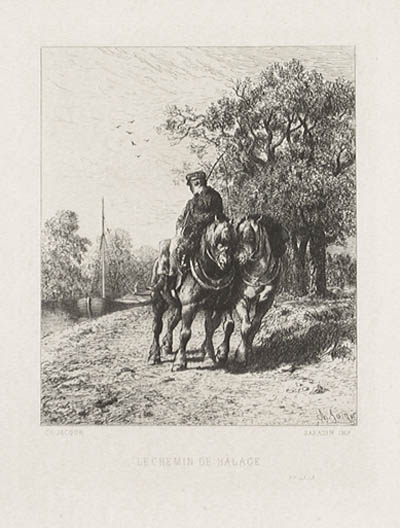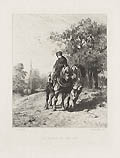| Title: |
Le Chemin de Halage (The Towing Path) |
| Artist: |
Jacque, Charles Emile 'Charles Jacque' (Paris, 1813 - Anvers, 1894) |
| Date: |
1864 |
| Medium: |
Original Etching |
| Printer: |
Sarazin, Paris |
| Note: |
Charles Jacque 'Charles Emile Jacque': During the 1840's a most important
movement began in French art. A number of painters began settling in the
tiny village of Barbizon and dedicated their art to portrayals of nature
and rustic life. Given that the mainstream of traditional French art was
still mired in the genres of classical and historical paintings this was
indeed a revolutionary step. Barbizon artists gained their inspiration
from both the great landscape etchings and paintings of Rembrandt and
other Dutch 17th century masters and from the contemporary landscape art
of such British artists as Constable and Turner. In its turn, Barbizon
etchings and paintings led the way to the beginnings of French Impressionism
in the following generation. |
| |
Many of the leading artists associated with the Barbizon
school were also fine etchers. Within this category one should mention
such names as Corot, Millet and Daubigny. Charles Emile Jacque, however,
dedicated his career to the art of etching and became the most active
Barbizon artist in this field. He is thus considered a major precursor
to the French etching revival of the 1860's. |
| |
Born in Paris, Charles Jacque began his training as an apprentice
engraver to a mapmaker. After finishing his military service he spent
several years in London as an artist for the periodical, La Charivari.
Jacque exhibited his first work of art at the Paris Salon of 1833. Jacque's
earliest etchings date from 1842. Six years later he had completed an
astonishing 350 etchings dealing with rustic scenes, animal studies and
village life. During this time both Jacque and his close friend, Millet,
lived in the village of Barbizon. |
| |
Le Chemin de Halage dates from 1864. Of this period
in time F. L. Leipnik writes,
"Jacque's masterpieces may be found in the two series of landscapes
which he published in 1864 and 1866. In these plates, Jacque, sure of
his technical ability, attained his aim. All of them give charming visions
of rustic life conceived by a poet and executed by an etcher who was
among the best of his period." *
These words clearly apply to the beautiful "Le Chemin de Halage". |
| |
In total Charles Jacque created 470 original etchings. His
brilliantly rendered scenes of country life influenced an entire generation
of 19th century French etching. In 1867 Charles Jacque received the prestigious
Legion d'honneur from the French government. |
| Provenance: |
From the collection of Roger Trlak and bearing his inventory
number, T-426, on the verso. Roger Trlak (1934-1975) established the commercial
art company of Martin-Trlak in Chicago. In 1972 he also opened the RST
Gallery in Scottsdale, Arizona where he exhibited not only his own large
collection of 19th and 20th century art but also held important exhibitions
of many modern artists. These Included such major American and international
printmakers as Joseph Hirsch, Luigi Lucioni and Paul Wunderlich. Among
Trlak's closest friends in the arts community were Raphael Soyer, Ivan
Albright and Hans Burkhardt. Their original prints and paintings were
constantly exhibited at the RST Gallery until it was closed in 1975 due
to Trlak's untimely death. |
| Raisonne: |
J. I. Guiffrey, Charles Jacque, Catalogue de ses eaux-fortes
et pointes-seches, Paris, 1866. |
| |
Catalogue # G. 200, Second State of Two as Published in Paris in 1864. |
| Reference: |
* F. L. Leipnik, A History of French Etching, London, John Lane, 1924, pp. 76 - 78. (Quotation on p. 77.) |
| Size: |
8 X 6 3/4 (Sizes in inches are approximate, height preceding width of plate-mark or image.) |
| |
Framed and Matted with 100% Archival Materials |
| |
View larger Framed Image: |
| |
 |
| Buy Now |
Price: $595.00 US |
| Condition: |
Printed upon hand-made, laid paper and with full, large
margins as published in Paris in 1864. Signed by Jacque within the plate
to the lower right. A brilliant, tonal impression and in excellent condition
throughout. Altogether, Le Chemin de Halage is a prime example
of the art of Charles Jacque, one of France's greatest masters of nineteenth
century etching. |
| Important Information: |
The artist biographies, research and or information pertaining to all the original works of art posted on our pages has been written and designed by Greg & Connie Peters exclusively for our site, (www.artoftheprint.com). Please visit us regularly to view the latest artworks offered for sale. We will soon be posting an update of our most recent research and include the biographical and historical information pertaining to our next collection of original works of art created by artists throughout the centuries. We hope you found the information you were looking for and that it has been beneficial.
Our Gallery, (Art of the Print / www.artoftheprint.com) guarantees the authenticity of every work of art we sell 100%. Full documentation and certification is provided. We offer a wide selection of international fine art dating from the early Renaissance to the contemporary art period. |








![]()
![]() or
phone Greg & Connie (905) 957-6666
or
phone Greg & Connie (905) 957-6666